The whole virtual volumes of articles are devoted to water supply of a country house or country house. A lot of information about this on our website. However, no less questions. Water in the country is often much more necessary than in the city — it is the usual urban comfort, and the ability to water the garden and garden.
If there is no main water pipeline or the water in it is of poor quality and intermittent, then, in addition to using a public well as a source of water supply, you can arrange your own water intake system directly on the site.
Let’s try to figure out what to choose for country house— well or borehole. And along the way, we will find out the positive and negative sides of these types of hydraulic structures for groundwater extraction and evaluate which option is preferable.
What is the difference between a well and borehole
What is the difference between a well and a borehole? You can find many opinions on this subject. For example:
- the well is wide and the borehole is narrow;
- borehole deep, and the wells are of a smaller depth;
- water from the well is lifted by the bucket manually, and from the borehole-by the pump;
- borehole has a higher flow rate than the well;
- what with the concrete rings is a well.
None of these differences defines borehole or well: there are borehole with a diameter of up to three meters, there are deep wells and small borehole, water from the well can be raised in any convenient way – both manual and mechanical. It happens that the drilled borehole has a small flow rate, and even dry. That is, if the drillers were not mistaken, is borehole, if they missed, — well? Wells can have a very different appearance and materials that form the walls, however, as borehole.
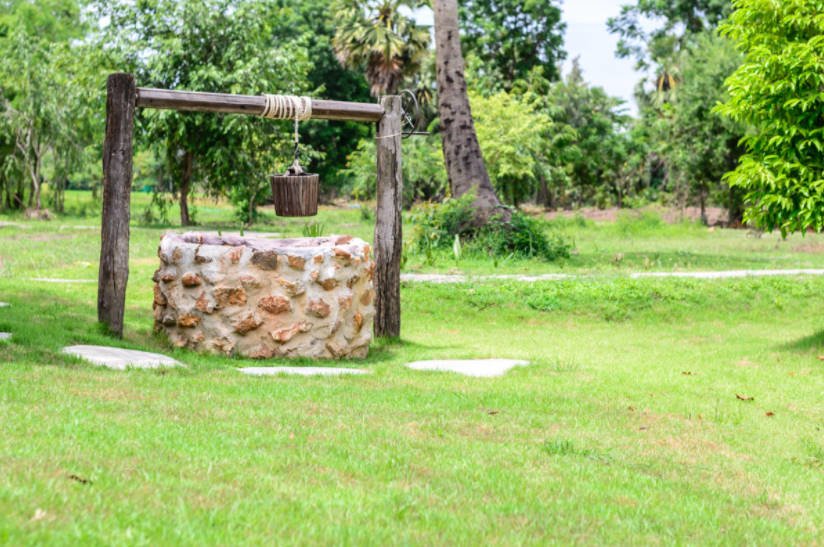
Wells can have a very different appearance
From a technological point of view, the well and borehole are the same. This is a hydraulic structure designed for underground water extraction, made in the form of a vertical recess in the ground. For wells it is accepted to call this deepening mine, for borehole-a trunk. Walls and wells, and borehole fortified from fraying. Both of these facilities are equipped with a device for lifting water to the surface.
It is believed that the main difference between the well and borehole is only in the way of construction: wells are dug, borehole is drilled. And, if manually, but drilled-before you borehole. And if you dig (for example, an excavator), the result will be a well. At the same time, different modifications of both borehole and wells can have different depth and diameter, method of device and equipment for water lifting.
As can be seen from the above, the differences between borehole and the well are very conditional, which, in General, and of course, because they are different names of the same structure. The British generally do not delve into these details is called the well and borehole in the same way: well water.
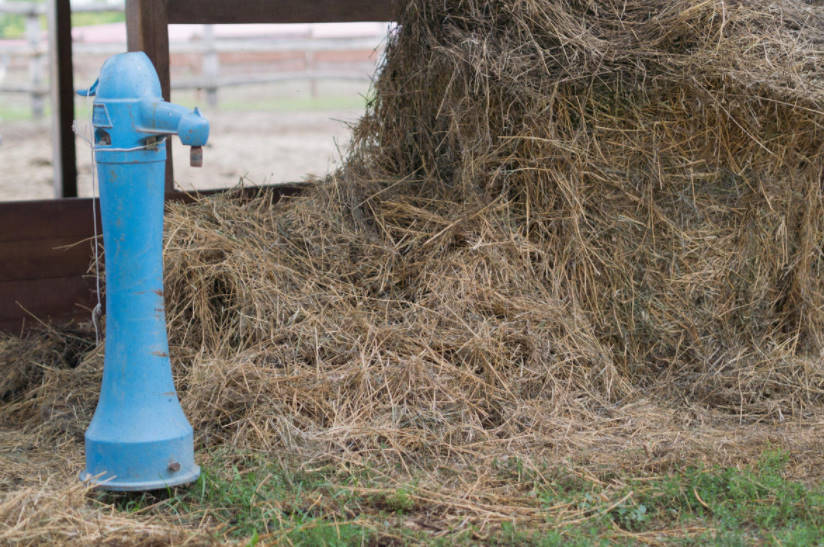
In English just well water
It is pointless to discuss the positive and negative qualities of borehole and wells in isolation from the specific situation, as well as to advise which method of water production is better. I will try to consider the main points that influence the choice. And for a start-a couple of common myths about wells and borehole.
Myths and reality
Today, water on the site for many seems an absolute necessity. Although until recently, citizens in rural settlements and horticultural associations quietly used public wells and summer water supply systems.
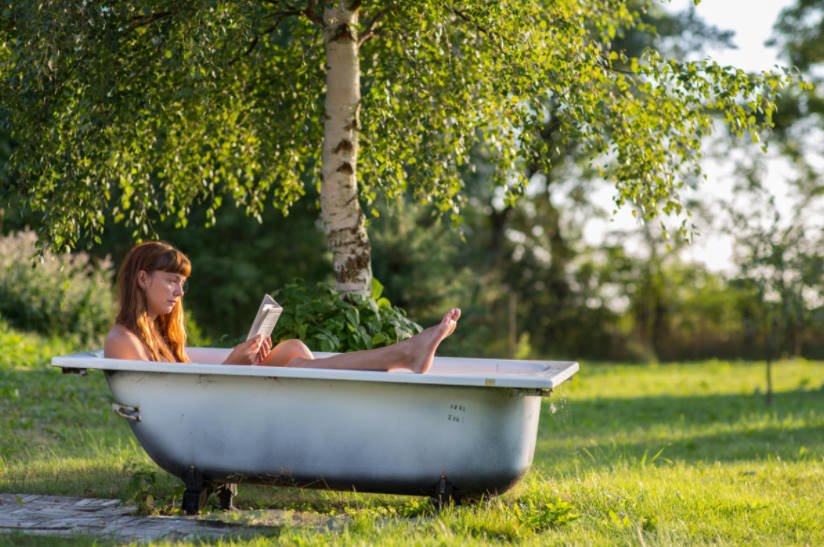
It’s nice to soak in the bath…
Demand, as you know, creates supply: if there are those who wish to have water supply at their site, there will certainly be those who offer this service. In the struggle for the client — market competition — there are all sorts of advertising and marketing moves that attract the solvent owner of suburban real estate. Moves, which often turn out to be myths.
The first myth: the deeper the borehole, the cleaner the water
Those who drilled borehole, state that borehole — construction more hygienic than a well. That the water extracted from the depths of the earth, clean as a tear, unlike the well, where, they say, flows all the stuff and start the frog.
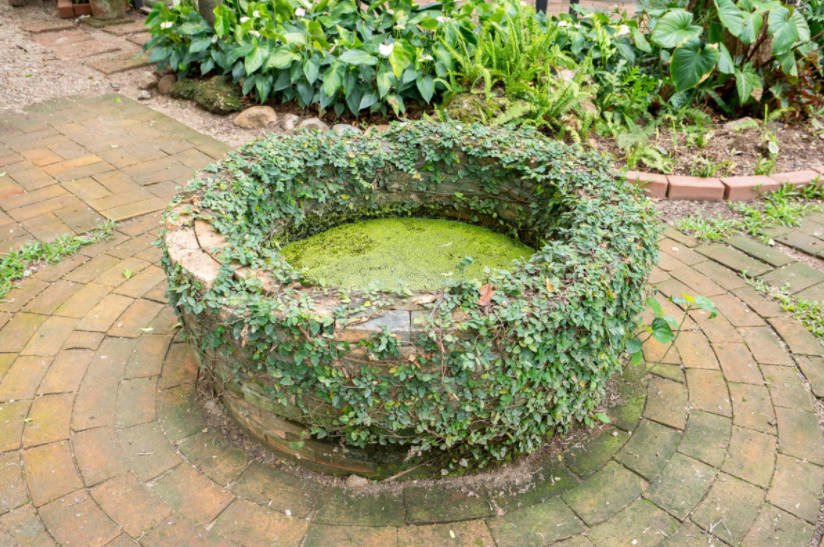
Abandoned well
Water purity is a relative concept. Clean, that is, free from any impurities, is distilled water, further subjected to boiling to remove dissolved gases and stored in a sealed container. All other, including natural, water contains a whole set of dissolved minerals, organic matter and micro-living. The amount and composition of these additives and impurities depends on the water source. Therefore, it is more correct to talk not about clean, but about water that meets drinking standards.
To obtain water that meets drinking standards, the so-called English slow filter, which is a layer of sand and gravel, is enough. The filter with such a device provides cleaning of 98% of contamination, including bacterial.
Such filters were once equipped with water intake facilities, for example, London, Berlin, Warsaw, supplying the citizens with water. And they were replaced by fast modern not because the water purified by them has ceased to meet modern standards of clean, but only because the cities increased water consumption.
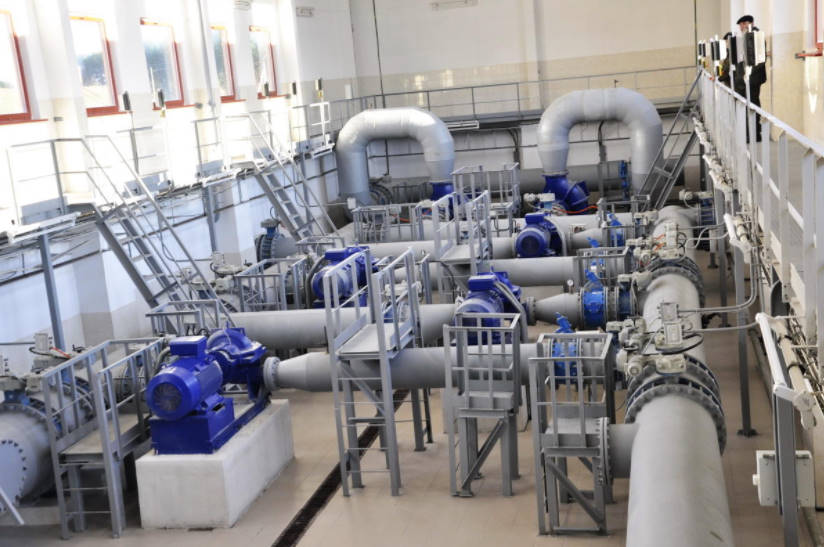
Urban water intake
Sand and gravel of different fractions in a slow filter are stacked in a certain sequence — from small to larger. This is how the sand and stones are located in the ground: in the upper layer of fine sand, below it becomes larger and there are stones. The thickness of the filling filter – 1700 mm.
The wells are filled from below, through the bottom, with ground water, which is precipitation that has seeped through the soil layer. It turns out that if the bottom of the well is located at a depth of about two meters, then it will already have water that meets sanitary standards: before it gets into the well, it passed a natural slow filter — a thickness of two meters of earth with sand and stones. It is important to protect the well shaft from water that has not passed through this filter, that is, through the leaky walls or above, through the neck.
And what about the borehole? The fine-cut borehole located in the first water horizon (the so – called sandy) is fed in the same way as the wells-water infiltrated from the surface. So the quality of water in such borehole and in a nearby well will be the same.
But the water in the deep borehole in most cases too mineralized. And, perhaps, its chemical composition will not correspond to the maximum permissible concentration of various substances in drinking water.

Does your water meet the drinking standard?
The water extracted from the depths, from the second and subsequent water horizons, from borehole “to limestone”, will be more rigid: it contains an increased amount of calcium. The same applies to artesian borehole-not every pressure borehole is suitable for drinking water. Perhaps this water will not be harmful to the body. It is likely to be even useful: the known mineral waters are extracted from a great depth.
In addition, the supply area of wells and shallow borehole is local: if the site is not located in the city dump or in the backyard of a chemical plant, and is in a relatively clean place, and harmful substances in the water, most likely, will not. But the lower water horizons have a large area of power, and often it can be located many kilometers from your borehole.

To determine the quality of water in the laboratory
Where you under the earth flowed the water is there to say after hydrological studies that borehole drillers are often not carried out. To ensure that your borehole will have drinking water that meets sanitary standards, drillers can not: the composition and quality of water can be determined only after the borehole is drilled and the analysis of water in the laboratory.
Myth two: to drill on your site artesian borehole need only your desire
Many organizations that offer drilling services and strongly advise customers exactly artesian borehole, do not mention the legal component of this issue.
According to the law, underground water is a state strategic reserve, lying in the depths. And, as you know, the subsoil is the property of the state, and their development can be carried out only with its permission. Therefore, the legal use of this strategic reserve is possible only with a license.

Before you order the drilling of the borehole, check out the Law “On subsoil”
So deep borehole require a license. And in addition to the need to obtain a permit for drilling (of course, for money), such borehole becomes a separate object of taxation — will have to pay taxes. The tax base is not borehole itself, but water extracted from it.
There are also restrictions: the extracted water should be used for private household needs, and the owner does not have the rights to sell or dispose of it even on a free basis. That is, if water is needed for entrepreneurial activities, from whatever depths it had been extracted, it is necessary to obtain a license. The volume of water extracted without a license is also limited-no more than 100 cubic meters per day.
There is one more point concerning the deep and artesian borehole license and which is often kept silent by companies offering drilling services, because it is not them, but your business as the owner. After obtaining a license and drilling a deep borehole, you are obliged to properly arrange the territory around it. It is necessary to arrange a sanitary protection zone, which consists of three belts.

There are many nuances…
And fines can be very significant.

Fines can be very significant
And now back to the pros and cons.
Pros and cons: how to choose your option
Any method of water production has both positive and negative sides. And the choice of a method depends on different reasons. For example, the groundwater on your site is deep. In this case, the advice is to choose a small well as a source of water, because its construction is more economical, does not make sense. Consider the factors that affect the choice.
- The depth of groundwater. If the groundwater is shallow, a well will suit you. If the water is twenty meters or more, the device of the well is possible, but becomes economically unprofitable, as the cost of the “ring” increases exponentially after the tenth: at a great depth it is difficult to work the digger, there is little air and other difficulties. Therefore, it may be more advisable to make a borehole. Some diggers increase the value of each buried ring by some amount.
- Water consumption. Before choosing a well or borehole, determine how much water you need. Counting on water consumption, it is necessary to divide domestic and technical water: for irrigation, you can make a separate source of water, it may be cheaper.
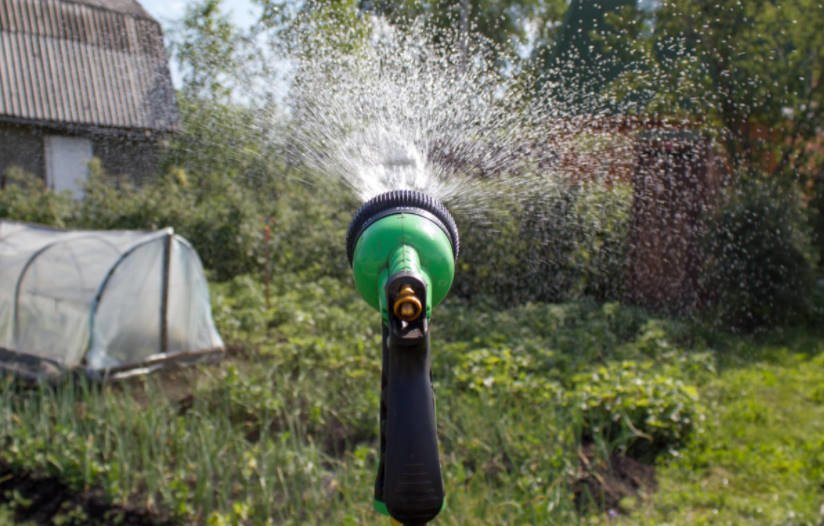
Do not forget about watering
The flow rate of a well or borehole is not determined by the desire of the owner or the skill of drillers and well diggers. It depends on local geological conditions — the amount of water in the water horizons and soil structure.
In deep borehole, especially artesian (pressure), the amount of water produced by the source per unit of time (flow) is large: up to 10 cubic meters per hour. In shallow borehole the volume of water is increased due to the depth. But the water delivery in this case is growing not so much because they drilled a deeper borehole and got to the “big water”. The amount of water is increased mainly due to the increase in the liquid column: borehole has a small diameter.
- Energy independence of water supply. From the well,as from borehole, water can be lifted with a pump, then arranging the usual water supply. But in case of power outage, you can get water from the well and with the help of a conventional bucket. The owner of borehole does not have such an opportunity. Borehole is energy dependent: no electricity — no water.
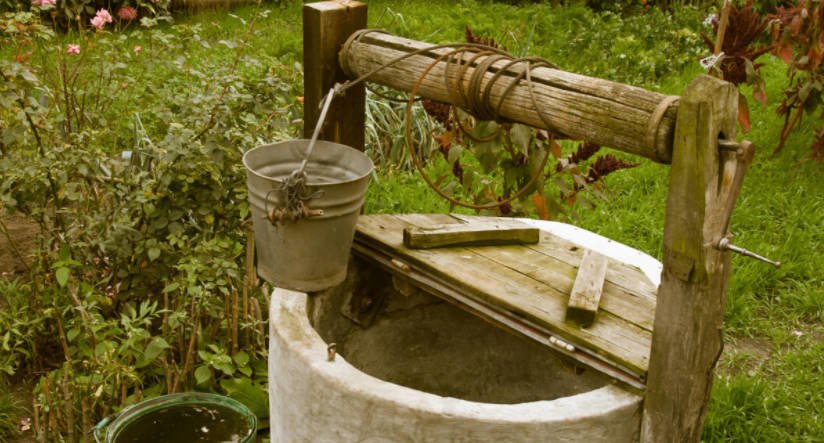
The well is non-volatile
- Financial issue. The cost of works on the structure of the well and borehole differs depending on the region. But the borehole, as a rule, deeper wells. Therefore, the construction of a “turnkey” standard well is cheaper. Do not forget that for the construction of borehole need a pump, head, construction of the caisson, hydraulic accumulator, filter system and so on. If borehole is deep, then don’t forget about the cost of getting a license. For the construction of the well will also require additional costs. Therefore, that is cheaper-borehole or well, “off the top” is difficult to determine.
- The accompanying complexity. If you drill borehole with the assistance of special equipment, then, first, you need to provide passage for it. Secondly, if the site is already landscaped, then perhaps some part of the flower garden or lawn from this technique will suffer. The device of a well, as a rule, brings less destruction. But at its digging it turns out more soil in the blade, which will need somewhere to put.
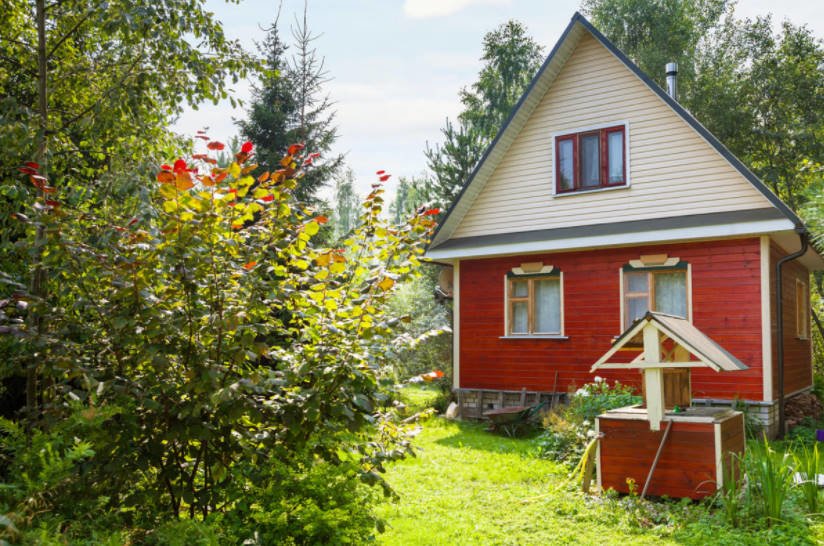
A device well brings less destruction
- Durability and maintainability of water intake facilities. How long a well or borehole will last depends on many reasons. Not always a short service life on the conscience of the builders. Well can tighten sand quicksand, borehole-dry. Repair and clean the well is much easier — you can do it yourself. Services in repair and maintenance of borehole specialists of the road. And in many cases, the repair is impossible.
What to choose as a source of water-a difficult question. We need to take into account a lot of things, in addition to “cheaper-more expensive”.
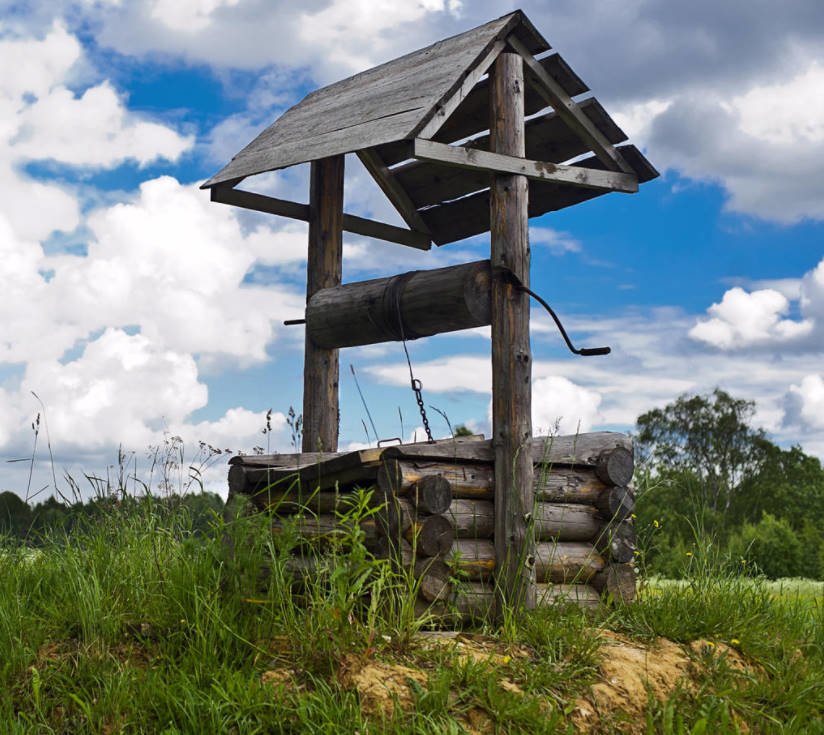
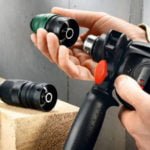




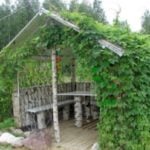



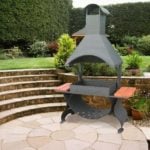







Thank you for all of the tips you provided for choosing a well or borehole. I love how you said that a well is easier to maintain and repair if necessary. My dad wants to invest in a new water system for our property, so I will be sure to suggest that he find a reputable water well company to drill one for our home.
It’s great that you talked about how a water well is a hydraulic tool made for water extraction. My wife and I want to start building our home. We’re at the planning stage of it, and we’ve heard about a water well’s benefits, so we’re thinking about installing one. We think that your article will give us the insight we need to make the best decision. Thanks for helping us understand the differences between a well and a borehole.
I’m glad you talked about the differences between a water well and a borehole. Recently, my wife and I started to plan our house’s construction, and we’ve heard about some water well benefits. We liked the idea of having our own water source, so we’ll be sure to read your article carefully before making any decision. Thanks for the information on wells and their types.
I appreciated it when you shared that it is important to obtain a permit for drilling a well in your residential house. My friend just mentioned the other day that he is planning to drill a water well for his new house that is located in the countryside area. I will suggest to him hiring a reliable service that can help to do so once he has received the permit. gainouswelldrilling